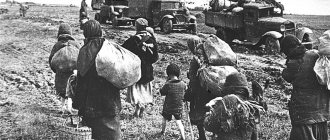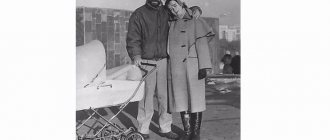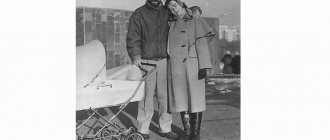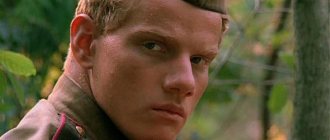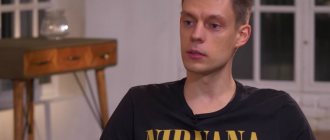Biography of Yuri Antonov
Yuri Antonov is a Soviet pop legend, composer and poet, whose songs are listened to and sung by entire generations. The total circulation of records by the first official Soviet millionaire reached almost fifty million. This is a singer who set a record for the number of concerts in Leningrad: almost thirty performances in half a month. Honored Artist of the Chechen-Ingush Autonomous Soviet Socialist Republic. People's Artist of Russia.
In the photo: Yuri Antonov
It is difficult to fit all the facets of the Maestro’s talent into one narrative, so we tried to collect only significant moments in the biography of Yuri Mikhailovich.
Childhood: Tashkent – Berlin – Molodechno
There was a war going on. Ukrainian girl Natasha Litovchenko from the Poltava region lived in evacuation in Tashkent, where the brave marine officer Mikhail Antonov came on vacation in 1944. Love broke out between them, and the lovers spent the entire vacation together. When the stay was over, the young man returned to the front, and his young wife remained waiting for him. It soon became clear that she was not waiting for Mikhail alone. In February 1945, a boy was born who was named Yura.
Yuri Antonov with his parents
Three months later, victory over the Nazis broke out. Mikhail, by order of the command, remained in service as deputy commandant of the Potsdam district. Natasha and her son were sent to him. At first, the young woman worked in the accounting department, but three years later her daughter Zhanna was born, and Natalya began to take care of the house and children. And then my son fell ill with polio. Natasha spent seven months with him in the hospital, feeding him and drinking from a spoon, until she got her beloved son back on his feet.
Little Yura Antonov with his father, 1949
In one of his interviews, Antonov recalled how he was struck by a photograph of his dad in the dugout. Three young smiling guys in black caps and with machine guns at the ready are sitting, and the father has a huge watch on his hand on a thin strap. When little Yura asked what trenches they were sitting in, Mikhail Vasilyevich answered briefly: “Stalingrad.” The artist carefully keeps this photograph in his home archive.
Yuri Antonov in childhood
Soon after Zhanna’s birth, her father was sent from the GDR to one of the Belarusian garrisons, and the family settled in the city of Molodechno. Here Yura went to two schools at once, general education and music. Little Yura always liked how his energetic mother sang Ukrainian songs, while his father lost his usual sternness.
Yuri Antonov in his school years
As soon as the boy realized that he liked making music, Yura was offered to become... the director of the choir at the railway depot. He was fourteen, he felt like an adult, and when the boy brought home his first salary for the first time, his parents were amazed. They realized that music in their son’s life was serious and long-lasting.
Personal life
In numerous interviews, the legendary singer always openly says that he loves women, but Yuri Antonov does not share information about his personal life. As he said in one of his interviews, he understands that everyone is interested in who he is dating, who he has deceived, but he is still an active composer...
It is known that he was officially married three times, and all his ex-wives live abroad. Each time, according to the singer, he married for love. The first wife, Anastasia, emigrated to America; in fact, they were supposed to leave together. Antonov helped the girl collect all the necessary documents and bought tickets. However, at the last moment he changed his mind and remained in the Soviet Union.
Youth: Molodechno – Minsk – Leningrad
To continue his education, Yuri entered the folk instruments class of the music school there, in Molodechnoye. Having experience as a choir director, he organized a pop orchestra at the local House of Culture. They really didn’t want to let Antonov leave the team when he was assigned as a teacher to a children’s music school in Minsk. But the pedagogical path was not for Yuri’s character. When the opportunity arose, he took the place of instrumental soloist in the State Philharmonic.
Already at the age of 14, Yuri Antonov led the orchestra
From there, Antonov was drafted into the ranks of the Soviet army. The young man remembered his service in the internal troops of the Ministry of Internal Affairs for the fact that there he managed to create an amateur ensemble, with which they performed at various army events.
Yuri Antonov in the army
Returning from the army, Yuri took the position of musical director of “Tonika”, the ensemble of Viktor Vuyachich. He made arrangements, composed sketches and even managed to appear playing the guitar in the Belarusfilm film “Why Shouldn’t We Sing!”
Poster for the performance of “Tonics” with Antonov in the lineup
One day a bass player approached him and showed him his poems: “Maybe we can write some songs?” This is how “Song about good fellows and fair maidens” and “Stop, don’t shoot, soldier!” appeared. Perhaps Antonov would have remained at Tonic if it had not been for chance.
Yuri Antonov in his youth
And the incident arose in the city of Donetsk, where the ensemble was on tour. The concert, on the occasion of the day off, was attended by musicians from the VIA “Singing Guitars” that was thundering throughout the Soviet Union (at that time they were almost the “Beatles” of the Soviet stage). After the concert, the guys simply approached Yura and invited him to join their team as an instrumental keyboardist. Taking guitarist Anatoly Chizhevsky with him from the band, Antonov moved to Leningrad.
Childhood and youth, family
Yuri Antonov is the son of a serviceman. The future singer was born during the war, and this largely influenced the character of the famous singer. His birth occurred on February 19, 1945 in Tashkent. Father, Mikhail Vasilyevich, served in the Marine Corps as an officer, and after the war he was appointed to the military administration of the Soviet unit in the city of Berlin, where the whole family was forced to move. The singer’s mother, Natalya Mikhailovna (nee Litovchenko), was evacuated during the war and then raised children.
By the way, in Germany, another child was born into the Antonov family - the sister of the future singer and composer Zhanna.
At the time of his sister’s birth, Yuri himself was only 3 years old. Soon, the soldier’s family is transferred from Germany to Belarus, where they have to go through several garrison towns. But the family settles for a long time in the military garrison town of Molodechko, where Yuri’s musical career begins.
While still studying at school, Yura enters a music school, to which his mother brought him. As soon as his studies there were completed, he, accordingly, entered the music school in the city of Molodechko, where he entered the folk instruments class.
In 1963, Antonov completed his studies at the music school. His parents had already moved to Minsk by that time. Therefore, according to the distribution, the future composer ends up in the Minsk children's music school, where he was offered to work as a teacher.
First steps to glory
The beginning of the seventies in the USSR was marked by stagnation in all directions, including on the stage. And here “Singing Guitars” presents a composition that shook up all ideas about the Soviet song - “There is no one more beautiful than you”, without exaggeration, the whole country sang. And for the first time, the name of performer and composer Yuri Antonov was heard throughout the country. No one yet knew what he looked like; those years were quite difficult for a young man who was not taken entirely seriously: After “Singing Guitars” in Leningrad, Antonov had a joint work with “Good Fellows” in Moscow and recorded an album where the songs appeared composer “No, not me”, “Why”, “The current carries me”. Next came work with the Sovremennik orchestra, with which Antonov recorded his first EP with the songs “Well, what to do with it,” “The Third Day,” “At the Birches and Pines.” Yuri Mikhailovich also worked at the Moscow Music Hall, and also as the artistic director of Magistral, a vocal and instrumental ensemble.
As part of the VIA “Singing Guitars” (1969)
Antonov’s songs are included in their repertoire by “Jolly Fellows”, “Earthlings”, “Singing Hearts”, “Red Poppies”, as well as Valery Obodzinsky and Lev Leshchenko. However, the path to the silver screen was closed to him, since he was not a member of the Composers' Union. For the same reason, many of his songs were not allowed for publication.
As part of the “Good Fellows” (top row, right)
Music
In 1969, a talented musician received an invitation from Leningrad. The vocal and instrumental ensemble “Singing Guitars” invited Antonov to the position of keyboard player. This team became a launching pad for the creative endeavors of the young performer. Yuri performed as a vocalist for the first time, and the first songs of his authorship were performed in the same ensemble: “Stop, don’t shoot, soldier!”, “Airport”, “Where is the courage?”
The hit of that time was the composition “If You Love,” for which the music was written by Yuri Antonov himself, and the text was a compilation of works by Irina Bezladnova and Mikhail Belyakov. This song was released on a separate EP in 1971.
Bezladnova also co-wrote “You Are No More Beautiful,” which put an end to the collaboration between Antonov and “Singing Guitars.” Yuri replaced the difficult-to-pronounce “moment” from the performer’s position with “vision.” And the 3rd verse belongs to the pen of Mikhail Belyakov, guitarist of “Good Fellows”. The song was already recorded by the lead singer of “Singing Guitars” Evgeniy Bronevitsky. The artist felt that the 3-verse composition was too long. In the end, there were 2 left, but a bass guitar solo was added.
Yuri showed the same exactingness towards euphony in his work on the song “Mirror” - he didn’t like the phrase “I look at you like in a mirror, I’m dizzy.” Lydia Kozlova, the wife of the author of poetry Mikhail Tanich, later said that at first she regretted it when her husband gave the work to a little-known composer. Antonov wrote the melody overnight.
In the 70s, Antonov changed his team: he worked as a vocalist in the capital’s VIA “Good Fellows”, then played in the “Sovremennik” orchestra, and became the director of “Magistral”, an ensemble created at the Moscow Regional Philharmonic. The musician collaborates with David Tukhmanov, recording his vocal part on the disc, and already in 1973, Yuri Antonov’s first original album was released.
To avoid bureaucratic red tape with the publication of large opuses, the musician publishes a series of small records, minions, which contain 1-2 songs. These minions brought glory and fame to the composer, as the songs quickly went to the people thanks to the talent of the author and the precise fit into the spirit of the era.
Yuri Antonov’s songs “Well, what should we do with him” and “If you love” (for both of them the lyrics were written by Leonid Derbenev) are heard at the “Jolly Fellows” concerts, in addition, more and more new groups include compositions composed by him in their repertoire. Thus, VIA “Singing Hearts” performed the song “Indian Summer”, “Watercolors” - “Red Summer”. The popular group “Earthlings” used 4 songs, including “Believe in a Dream.”
In addition to groups, Antonov’s songs were also sung by individual artists, for example, Lev Leshchenko. But, despite such popularity and demand, Yuri for a long time was not able to get on television and release a full-length record, since the musician at that time was not a member of the Union of Composers.
In the 80s, Antonov began collaborating with the rock group Araks, and this brought him all-Union fame. The musicians released 3 EPs, which sold over 20 million copies throughout the country. The songs “The Roof of Your House”, “Don’t Forget”, “Golden Staircase” and “Dream Come True” sounded from literally every window. The singer joins the ranks of the most famous performers of the Soviet Union and takes 1st place in the “Soundtrack” hit parade. Young performer Katya Semenova wins the Golden Tuning Fork competition with the song “Spring” by Yuri.
Antonov's first big original album is being released outside the Union. In 1982, the disc was released by the Yugoslav company Jugoton, and the following year the musician moved to the Chechen-Ingush SSR, where he worked as a soloist of the local philharmonic for 3 years. At the same time, a close friendship began with choreographer Makhmud Esambaev.
Yuri collaborates with the Blue Bird ensemble. The result of collaboration in the studio and on tour is the giant concert album “Blue Bird”. At the same time, the composer's first giant disc was presented. Among Antonov’s most famous songs of those times, the composition “Wider Circle” stands out, which became the title song of the television festival of the same name.
The hit “On Kashtanova Street” is a gift from Yuri Antonov and Igor Shaferan for the 30th anniversary of the formation of the Crimean region. The composer sketched out the melody in half an hour and just as quickly made a studio recording, without counting on the future. And, as life has shown, I was wrong. I liked the song, and fans even tried to find the route mentioned in the text. According to rumors, residents of Gelendzhik were lucky to walk along Vinogradnaya, Apricotova and Tenistaya.
The composer also writes songs for children: together with songwriter Mikhail Plyatskovsky, Yuri Antonov records several records with fairy-tale musicals about the adventures of Kuzi the Grasshopper.
Together with the Airbus ensemble he organized, Yuri Antonov gives many sold-out concerts at the largest concert venues in the country. Video recordings of performances are now distributed on the Internet as full-fledged clips. In 1984-1985, 2 giant albums were recorded: “The Long-Awaited Airplane” and “Believe in the Dream.”
At this time, the song “Sea” becomes especially popular. Yuri Antonov's tour record has not yet been broken by any of his colleagues in the CIS countries: 28 concerts were given in Leningrad in 15 days, and each one drew a full house.
In 1985, the composer travels to Finland, where he publishes the English-language opus My Favorite Songs, and upon his return becomes a soloist of the Mosconcert. In 1987, the album “From Sadness to Joy” was released, and in the same year a scandal occurred that led to 2 years of persecution of the artist. At a concert in Kuibyshev (now Samara), the singer spoke harshly about local officials. This led to the fact that for 2 years the political apparatus and the media denigrated the artist in every possible way.
Antonov’s next album, “Moonlight Path,” was released only in 1990, after the collapse of the Union. 20 years later, these compositions and albums will remain just as popular.
In the 1990s and 2000s, Yuri Antonov was a constant participant in the “Song of the Year” television festival. At the beginning of the 2000s, the artist decided to try his hand as a producer of singer Svetlana Almazova, but the songs from the album “Sweet Honey” were not played on the radio, so the project quickly closed.
Since then, the composer has practically not released new songs. One of his few recent works that gained popularity is his joint performance with singer Leonid Agutin of a composition called “On the Arbat.”
Antonov received a number of awards for his creative work. At the end of the twentieth century, Yuri received the title of Honored and then People's Artist of Russia. Over the years, the composer has been nominated for the Order of Francis Skaryna, Friendship, Honor, as well as the Order of Merit for the Fatherland, IV degree. He is a laureate of the All-Russian Ovation Award in the specially created Living Legend nomination.
Breakthrough and recognition
All-Union fame came to the composer with the collaboration of the Araks group. Despite the fact that the artistic council banned the release of their joint album, Antonov released several minion records that were in great demand in music stores. It was then that the famous compositions “Mirror” and “Anastasia”, “Golden Staircase” and “I Remember”, “Life” and “Twenty Years Later”, “Poppies” and “The Roof of Your House” appeared. With over twenty million copies sold, Minions sold out almost instantly throughout the country. Yuri Antonov. The film “I Don’t Regret Anything” “Soundtrack” calls Antonov the best singer of the USSR in 1982, but only those who have attended his concerts know the composer’s face. But he actively collaborated with the Odessa Film Studio, where the film “Take Care of Women” was shot. Almost all the music in the film is performed by the composer. Yuri Antonov - Take care of women Yuri Antonov saw his first full-length studio album in Yugoslavia. It was released with the assistance of Jugoton in 1981. The commercial success of the disc was picked up in Czechoslovakia, Poland, the GDR, and Cuba. Then the composer left Rosconcert because he was denied the title of Honored Artist of the Russian Federation at a time when his songs and performances with the Airbus group attracted tens of thousands of people to stadiums.
Yuri Antonov and the Airbus group
A friend, Makhmud Esambaev, came to the rescue and invited Antonov to perform under the auspices of the Grozny Philharmonic. There were administrators working in Grozny who took Antonov’s team into circulation much faster. The ensemble toured throughout the USSR, performing very often at various venues in the North Caucasus for three years. It was in Grozny that the talent and professionalism of the singer and composer were appreciated, awarding him the title of Honored Artist of the Chechen-Ingush Autonomous Soviet Socialist Republic.
Cover of Yuri Antonov's first studio album (1981)
And then the moment came when Yuri Antonov was invited to work by Mosconcert: Finally, she released two giant albums with songs by Yuri Antonov. The first is “Blue Bird” at the Sports Palace in Luzhniki.” It includes such famous songs as “White Ship”, “I’m Coming to Meet You”, “Wild Horses”, “Take Care of Women” and others. The second is the author’s disc “The Roof of Your House,” which includes almost all the songs previously recorded on minions. The composer first appears as a performer in the final “Song of the Year,” where “The Roof of Your House” was performed live throughout the Soviet Union. Yuri Antonov - The Roof of Your House (Song of the Year - 1983) Antonov also performed as a composer in “The Adventures of the Grasshopper Kuzi” and “The New Adventures of the Grasshopper Kuzi,” a children’s musical released on two giant records. The maestro worked in close collaboration with the poet Mikhail Plyatskovsky.
An invitation to the television project “Wider Circle” was also significant for Yuri Antonov, where he presented a song of the same name, which became the anthem of the television festival.
Yuri Antonov - Wider Circle (1983) The second half of the eighties again brought the artist encounters with cinema. He writes compositions for the feature films “Before We Part,” “Beauty Salon,” “Order.” In the first named film, director Alexander Kosarev even persuaded Antonov to star in the role of an artist named Ryzhikov. In honor of the fortieth anniversary of the great Victory, the composer, the son of a front-line soldier, wrote piercing music based on the poem “Bullfinches” by Mikhail Dudin. With this song, he later again got into the “Song of the Year”.
Still from the film “Before We Part”
The composer at different times worked with outstanding songwriters - Leonid Derbenev, Lev Ashanin, Igor Shaferan, Mikhail Tanich, Igor Kokhanovsky. Here, for example, is how he recalls his acquaintance with Leonid Fadeev: Soon two more large discs, “Believe in the Dream” and “The Long-Awaited Airplane,” with new songs by Antonov, were released. In addition, in Finland he recorded and released the English-language giant disc My Favorite Songs. After some time, another giant album, “From Sorrow to Joy,” appeared, and Central Television showed the musical tape “About You and About Me,” where it presented a collection of videos for Yuri Antonov’s songs, both long-loved by the mass audience and completely new ones. Yuri Antonov - About you and about me The artist’s live performances are always sold out; in Leningrad he gives two concerts a day and at each of them there are fourteen thousand spectators.
Discography
- 1970 (minion) - VIA “Singing Guitars” (one of the songs is “You are not more beautiful”) (Melody);
- 1970 (LP) - “To everyone who loves a song” (one of the songs is “You are not more beautiful” performed by VIA “Singing Guitars”) (Melody);
- 1971 (LP) - Gyulli Chokheli (one of the songs is “Song, Guitar and Me”) (Melody);
- 1973 (EP) - Yuri Antonov and the Sovremennik Orchestra (Melody) (“Don’t be sad, please”, “Well, what should we do with him?”, “At the birches and pines”);
- 1973 (EP) - Yu. Antonov and the Sovremennik Orchestra (Melody) (“The Third Day”, “Well, What to Do with Him?”, “At the Birches and Pines”);
- 1973 (minion) - VIA “Jolly Fellows” (songs “If You Love”, “Well, What to Do with Him?”) (Melody);
- 1973 (EP) - VIA “Good Fellows” (one of the songs is “About Good Fellows”) (Melody);
- 1973 (LP) - VIA “Singing Hearts[en]” (one of the songs is “If you love”) (Melody);
- 1973 (minion) - Lev Leshchenko (songs “Your Destiny”, “White Snowstorm”) (Melody);
- 1974 (EP) - VIA “Akvareli” (one of the songs is “Red Summer”) (Melody);
- 1974 (LP) - VIA “Jolly Fellows” (one of the songs is “Why”) (Melody);
- 1974 (EP) - Yuri Antonov and VIA “Magistral” (songs “Our Highway”, “Forget”) (Melody);
- 1975 (EP) - Yuri Antonov and VIA “Good fellows” (songs “Forget”, “No, not me”) (Melody);
- 1975 (EP) - “Yuri Antonov Sings” (“Why”, “No, Not Me”, “The Current Carries Me”) (Melody);
- 1975 (minion) - Valery Obodzinsky (songs “I sing for you”, “How is it so”) (Melody);
- 1975 (EP) - “Stereostrada” (one of the songs “Yesterday (Mailbox)”) (Melody);
- 1977 (LP) - “Indian Summer. Songs on the station I. Kokhanovsky" (songs "Indian Summer", "Garden Ring", "It's the Fall of the Leaves", "Without You") (Melody);
- 1978 (LP) - VIA “Jolly Fellows” (one of the songs is “Meeting”) (Melody);
- 1978 (EP) - VIA “Good fellows” and VIA “Leisya Song” (one of the songs is “Yesterday (mailbox)”) (Melody);
- 1978 (minion) - VIA “Red Poppies” (one of the songs is “Mirror”) (Melody);
- 1979 (EP) - Yuri Antonov with the group “Araks” (“Golden Staircase”, “To You”, “Mirror”, “Anastasia”) (Melody);
- 1980 (EP) - Yuri Antonov with the group “Araks” (“I Remember”, “Don’t Forget”, “My Wealth”) (Melody);
- 1981 (minion) - group “Araks” (“Why would?”, “Everything as before”) (Melody);
- 1982 (tape) - group “Araks”, “Concert at the Leningrad Sports and Concert Hall” (“Don’t forget”, “Why would you?”, “Alarm Bell”);
- 1982 (minion) - Yu.M. Antonov with the group “Araks” (“Life”, “Road to the Sea”, “20 Years Later”) (Melody);
- 1982 (minion) - Yuri Antonov (“Poppies”, “Sea”, “That’s how it happens”) (Melody);
- 1982 (EP) - Yuri Antonov (“Our Highway”, “The Roof of Your House”, “Native Places”) (Melody);
- 1982 (minion) - VIA “Earthlings” (one of the songs is “Believe in a Dream”) (Melody);
- 1981 (LP) - Yuri Antonov (Jugoton, Yugoslavia);
- 1983 (tape) - VIA “Blue Bird”, “Concert 02/15/1983” (“Life”, “That’s how it happens”, “I’m sorry, of course”);
- 1983 (LP) - VIA "Blue Bird". “Blue Bird at the Sports Palace in Luzhniki” (“White Ship”, “It will heal before the wedding”, “Take care of women”, “I am coming to meet you”, “Colored sounds”, “Wild horses”, “Moscow”, “With you” good for me") (Melody);
- 1983 (LP) - Yuri Antonov. “The Roof of Your House” (11 songs performed by the author) (Melody);
- 1983 (LP) - “The Adventures of the Grasshopper Kuzi” (Melody);
- 1983 (LP) - “New Adventures of the Grasshopper Kuzi” (Melody);
- 1985 (LP) - Yuri Antonov. “Believe in a dream” (9 songs performed by the author) (Melody);
- 1985 (LP) - Yuri Antonov. “My favorite songs” (Polarvox Music, Finland);
- 1986 (minion) - Yuri Antonov. “Yuri” (Polarvox Music, Finland);
- 1986 (LP) - Yuri Antonov. “The Long-Awaited Airplane” (9 songs performed by the author, arranged by V. Golutvin) (Melody);
- 1987 (LP) - Yuri Antonov. “From sadness to joy” (3 songs performed by the author, songs performed by the group “Araks”) (Melody);
- 1988 (LP) - “The grasshopper Kuzya is wanted” (Melody);
- 1989 (LP) - “Grasshopper Kuzya on the planet Tuami” (Melody);
- 1990 (LP) (45 vol.) - “Moonlight Path” (songs performed by the author) (Metadigital);
- 1990 (CD) - “Moonlight Path” (Melody);
- 1991 (CD) - “Mirror” (Distronics Ltd.);
- 1993 (CD) - “The Current Carries Me” (Z-Records);
- 1994 (CD) - “Music and songs from films. Yu. Antonov" (RDM);
- 1994 (CD) - “Moonlight Path” (Z-Records);
- 1996 (CD) - “Songs for Children[en]” (Z-Records);
- 1996 (CD) - “Mirror” (Z-Records);
- 1998 (2CD) - “From Sadness to Joy”;
- 2001 (CD) - “You are no more beautiful. 50/30" (Fiam-Disk);
- 2008 (CD) - “You are no more beautiful. 50/30" ();
- 2018 (CD) - “Road to the Sea.”
Music for songs
Song title - (poet):
- At the birches and pines - (Igor Davydovich Shaferan);
- Third day - (Pavel Leonidovich Leonidov);
- Well, what to do with him - (Leonid Petrovich Derbenev);
- Don’t be sad, please - (Onegin Yusif ogly Gadzhikasimov);
- Why - (Tatyana Alekseevna Sashko);
- I wish I could forget - (T. Sashko);
- This is Moscow (David Fedorovich Tukhmanov - L. Derbenev, I. Shaferan);
- Golden Staircase - (Mikhail Borisovich Vickers);
- To you - (Lev Ivanovich Oshanin);
- Mirror - (Mikhail Isaevich Tanich);
- Anastasia - (Leonid Fadeev (real name - Leonid Yakovlevich Gendel));
- I remember - (L. Fadeev);
- Don’t forget - (M. Tanich);
- My wealth - (Igor Vasilievich Kokhanovsky);
- Life - (Oleg Evgenievich Zhukov);
- Road to the sea - (L. Fadeev);
- Twenty years later - (L. Fadeev);
- Maki - (Grigory Mikhailovich Pozhenyan);
- Sea - (L. Fadeev);
- This is how it happens - (Viktor Nikolaevich Dunin);
- Our highway - (V. Dunin);
- The roof of your house - (Mikhail Spartakovich Plyatskovsky);
- Native places - (M. Plyatskovsky);
- Believe in your dream - (I. Kokhanovsky);
- My youth is leaving - (L. Fadeev);
- I don’t regret anything - (L. Fadeev);
- My path is simple - (O. Zhukov);
- On Kashtanova Street - (I. Shaferan);
- No laughing matter - (L. Fadeev);
- If we go together - (Vladimir Borisovich Kuzmin);
- Bullfinches - (Mikhail Alexandrovich Dudin);
- Give me your hand - (I. Kokhanovsky);
- The long-awaited plane - (Alexander Borisovich Kosarev);
- Glass Night - (V. Dunin);
- On the high bank - (Sergey Ivanovich Alikhanov);
- My dear - (I. Shaferan);
- About you and about me - (A. Kosarev);
- Intoxicated lilac - (A. Kosarev);
- And somewhere... - (A. Kosarev);
- The long-awaited plane - (A. Kosarev);
- Vacations - (I. Shaferan);
- And life goes on as usual - (V. Dunin);
- You understand only over the years - (Valery Veniaminovich Sautkin);
- From sadness to joy - (Boris Savvovich Dubrovin);
- I won’t forget you - (R. Gamzatov, translation by R. Rozhdestvensky);
- Tomorrow - (I. Kokhanovsky);
- The ugly duckling - (L. Fadeev);
- Everything is as before - (V. Dunin);
- Alarm bell - (I. Kokhanovsky);
- Why? - (V. Dunin);
- Spring again - (I. Kokhanovsky);
- Strawberry meadow - (V. Dunin);
- Rainbow - (L. Fadeev);
- Moonlight path - (S. Alikhanov);
- Don’t tell me “Goodbye” - (Mikhail Ryabinin (real name - Mikhail Iosifovich Meerovich));
- Get better, get well soon - (S. Alikhanov);
- Wonderland - (M. Ryabinin);
- If... - (Oleg Borisovich Vilenkin);
- Lanes of Arbat - (O. Vilenkin);
- White motor ship - (V. Dunin).
Ban Antonov, despite publicity!
In 1987, at one of the concerts in Samara (then Kuibyshev), the artist was performing one of the popular hits when a cry of “hack work” came from the audience. Antonov fell silent, left the stage and did not finish the second part of the concert. In addition to five thousand spectators, the top regional leadership was also present at the performance. She was silently present; it was beyond her strength to applaud. And Yuri, according to him, said something like that, saying he understands that the first rows of tickets are not being bought. And the management was offended.
In the late 80s, Yuri Antonov became persona non grata
The singer’s next performance in the city was deliberately disrupted, its director, Slava Beilin, was arrested by the police, and the “high-ranking public” organized persecution of the composer in the media. The correspondent of “Soviet Culture”, under the cheerful pseudonym of Prazdnikov, especially tried, throwing mud at the favorite of millions with some kind of malicious pleasure. After many years of perseverance and creative work, the artist could lose his further career. He was refused participation on almost all television channels. For two years, Antonov did not appear on the radio; he was banned from traveling abroad.
The media kept talking about his name for a long time, until the artist sent a letter to Mikhail Gorbachev. His appeal was read by one of the main helmsmen of perestroika, Alexander Yakovlev. According to the author of the book “Scandals of the Soviet Era” Fyodor Razzakov, it was Yakovlev who ordered the press to stop bullying the person. Four years later, Yuri Antonov became a member of the Union of Composers, and six years later - People's Artist of Russia.
Time out, but not stagnation
The beginning of the new millennium presented the master of the Soviet stage with a gift for his anniversary. His album “No More Beautiful You” was released, which included songs recorded five years earlier together with the Mikhail Finberg Orchestra. The artist himself considers this event significant in his work and life. The maestro also decided to try his hand at producing, but the “Svetlana Almazova” project was not successful, although Antonov helped the aspiring singer release her debut album “Sweet Honey”.
At the anniversary of Lev Leshchenko (1992)
Then the composer took a time out and even postponed the release of new albums indefinitely. In addition, the artist was outraged by the fact of piracy and the pointlessness of working on studio projects if the thieves of his work would profit from them. Only in 2009 did Igor Krutoy manage to persuade Yuri Antonov to come to Jurmala for the “New Wave”, where his colleagues prepared a surprise for him and arranged a creative evening for the master, performing his compositions. 2013 New Year was about, performed by the creative duo Antonov-Agutin.
Yuri Antonov in the new millennium
When the artist turned seventy years old, he received the Order of Friendship from President Vladimir Putin for his many years of creative, fruitful activity and significant contribution to the development of national culture. He was also awarded the Order of Francis Skaryna by the President of Belarus Alexander Lukashenko for his contribution to the strengthening of the Belarusian and Russian peoples. The master jokes that if he puts on all his awards, they will begin to crunch on his chest from tightness.
Awards and titles
State awards and titles
USSR awards:
- Medal "Twenty Years of Victory in the Great Patriotic War 1941-1945" (May 7, 1965) - The medal was awarded to all personnel of the Armed Forces of the USSR [en], who by May 9, 1965 were in the cadres of the Soviet Army, Navy, troops and bodies of the State Security Committee under the Council of Ministers of the USSR, internal troops, internal and convoy protection of public order of the Union republics;
- Honored Artist of the Chechen-Ingush Autonomous Soviet Socialist Republic. (1983).
Russian awards:
- Honored Artist of the Russian Federation (March 18, 1993);
- People's Artist of the Russian Federation (April 16, 1997);
- Order of Merit for the Fatherland, IV degree (January 17, 2005) - for his great contribution to the development of musical art and many years of creative activity;
- Order of Honor (February 16, 2010) - for services to the development of national culture and art, many years of fruitful activity;
- Order of Friendship (April 4, 2015) - for services to the development of national culture and many years of fruitful activity.
Foreign award:
- Order of Francis Skaryna (July 9, 2010) - for his contribution to strengthening friendship between the peoples of Belarus and Russia.
Personal life of Yuri Antonov
Antonov can talk for hours about creativity, analyze its different periods, but as soon as the conversation comes about his personal life, he turns the topic to cats, of which there are several dozen in the singer’s country house. However, Antonov loves not only cats, but animals in general: dogs and farm animals live in his private house.
Yuri Antonov is a passionate cat lover
Laughing, Yuri Mikhailovich compares cats to women who purr and caress only when they need something. The composer even treats his pets himself, without fear of being injured by their claws. Yuri Antonov about cats He spoke about his turbulent youth and some love stories only once in an interview. So, in his youth, the composer had a passionate but short-term affair with an employee of a recording studio, a Mexican by nationality. Antonov was also in love with Natalya Fateeva, who did not take his advances seriously. But he himself did not take his admirers and fans seriously.
Yuri Antonov did not take the interest of numerous fans seriously
The first girl Yuri had a crush on was the Arkhangelsk girl Rita. A beautiful girl - brown eyes, fair hair, black eyebrows. Both were sixteen years old when they walked hand in hand in Molodechno Park. Rita studied at the Polytechnic College, and then left with her family somewhere. Many years later she came to Antonov backstage, the artist barely recognized his first love in her. Yuri was busy with documents and tickets (at that time this was not a matter of two or three days), but he did not dare to leave the country with his legal wife forever. My father and mother in Minsk dissuaded me. He paid for his wife’s family to move, and he himself remained in the Soviet Union. Ida has lived in New York for a long time and the artist is glad that everything turned out well for her.
In many publications on the Internet, Antonov’s first wife is called Anastasia, but this information is unreliable, since the singer himself told about the name of his first wife in one of his interviews with Dmitry Gordon.
Yuri Antonov: the right to loneliness Antonov got his second wife during his collaboration with a Yugoslav recording company, her name was Miroslava Bobanovich. The position of the husband of a Yugoslav citizen allowed the composer to buy musical equipment of such quality that professional musicians in the USSR could only dream of. But family life did not work out with his second wife, who now lives in Zagreb.
Yuri Antonov and Miroslava Bobanovich
The third wife Anna, although Russian by origin, also did not want to live in Russia. She lives in Paris, as does Antonov’s adult daughter Lyudmila. The singer also has a son, Mikhail, who was born in 1996 and now lives in Moscow.
Daughter of Yuri Antonov - Lyudmila Antonova
The daughter of Yuri Antonov, Lyudmila Antonova, lives with her mother abroad and also does not communicate with her father. Antonov’s third wife, Anna, after the divorce left for France, namely Paris, taking her eldest daughter Lyudmila with her, while Mikhail remained in Moscow, apparently he was so used to this city that he did not want to leave the country. As was said earlier, Antonov does not talk much about his children, so there is no information about them, we can only say that Lyudmila did not connect her life with the stage.
Yuri Antonov now
Age and illness do not allow the legend of the Soviet and Russian pop music to engage in creativity in full force. However, in 2020, the long-awaited studio album “Road to the Sea” was released. As before, Antonov is very sensitive to the quality of lyrics and music. Perhaps this is precisely the secret of unfading songs that are remembered, listened to and loved, although some of them will soon be half a century old!
Age is not an obstacle to creativity.
Today's show business puts the production of songs on stream, often no one even remembers them, let alone name their favorite ones...Have we really run out of good words and music that touches the soul? The phenomenon of the domestic stage only smiles: Now the composer and singer lives in his own house in the suburbs of Moscow. He has a whole zoo to keep him company: cats, dogs, geese, peacocks, guinea fowl, squirrels. All of them have their own enclosures, the number of livestock is constantly increasing, because Antonov picks up many four-legged animals right on the street. The artist believes that in today's world, where people constantly betray and sell each other, animals are much more interesting and communicating with them gives him incomparable pleasure. Yuri Antonov - Believe in a dream (2019) The fact that the singer has suspended his creative activity does not mean that the composer does not write new songs. For him, this is a never-ending process. But by Yuri Antonov’s own admission, too much material has accumulated that needs to be dealt with. And if he writes only new compositions all the time, he will never get to the treasure chest (read: songs) that can become loved, memorable, and awaken the best feelings in people.
Antonov, Yuri Mikhailovich
Born on February 19, 1945 in Tashkent (Uzbek SSR, now the Republic of Uzbekistan) in the family of Mikhail Vasilyevich and Natalya Mikhailovna Antonov. His father was a military man, his mother was a housewife. After the end of World War II, Antonov’s father served in Berlin, then in various garrisons of the Belarusian SSR. Yuri Antonov studied at a children's music school in Molodechno (Minsk region of Belarus). At the age of 14 he led the choir at the local railway depot.
In 1963, Yuri Antonov graduated from the Molodechno Music College (now the Molodechno State Music College named after M.K. Oginsky) in the accordion class. After that, he was sent to Minsk as a teacher at a children's music school, and then began working at the Belarusian State Philharmonic as an instrumental soloist (accordion).
In 1964 he was drafted into the army, and after completing his military service he returned to the Philharmonic. In 1967, he became the musical director of the pop singer Viktor Vuyachich’s group “Tonika”. Since 1969, he played keyboard instruments in the Leningrad vocal and instrumental ensemble (VIA) “Singing Guitars”. In the same band I first tried myself as a vocalist. Yuri Antonov's popularity was brought by the song “There is no one more beautiful than you,” for which he composed music based on poems by Irina Bezladnova and Mikhail Belyakov. It was released on a mini-album in 1971. In 1970, Antonov moved to Moscow, where he became a soloist-vocalist of the Dobry Molodtsy VIA, then of the Sovremennik orchestra conducted by Anatoly Kroll. In the mid-1970s. created the ensemble "Magistral". At the same time, she released a number of records on which songs to Antonov’s music were performed by VIA “Jolly Fellows” and “Singing Hearts”, as well as singers Lev Leshchenko and Valery Obodzinsky. In 1979-1981 Yuri Antonov collaborated with the musical group "Araks", and in 1982 he created the group "Airbus". With these groups he recorded the songs “Mirror”, “Anastasia”, “Don’t Forget”, “Sea”, “On Kashtanova Street”, etc. In 1981, he composed music for the television film “Take Care of Women” by Viktor Makarov and Alexander Polynnikov, and subsequently Antonov’s compositions were also heard in the films “Before We Part” (1984, director Alexander Kosarev), “Beauty Salon” (1985, Alexander Pankratov-Cherny), “Order” (1987, Yuri Oksanchenko), “Predators” (1991, Alexander Kosarev ) etc. Yuri Antonov's first big album was published in 1981 by the Yugoslav recording company Jugoton. In 1983, Melodiya released the album “The Roof of Your House.” The title song of the album, written by Antonov to the words of Mikhail Plyatskovsky for the children's musical “The Adventures of the Grasshopper Kuzi,” gained popularity. The album also includes the hits “I Remember”, “Golden Staircase”, “That’s How It Happens”, “Twenty Years Later”. In 1985-1986 Yuri Antonov recorded his first English-language album “My Favorite Songs” at the studio of the Finnish company Polarvox Music (“Polarvox Music”). In 1986, he performed at the closing ceremony of the Goodwill Games in Moscow with the song “The World Depends on Us.” After 1990, Antonov’s CDs “Moonlight Path” (1990), “The Current Carries Me” (1993), “Music and Songs from Films” (1994), “Songs for Children” (1996), “Mirror” were published. (1996), “From Sorrow to Joy” (1998), etc.
Honored Artist of the Russian Federation (1993). People's Artist of the Russian Federation (1997).
Awarded the Order of Merit for the Fatherland, III and IV degrees (2020, 2005), Honor (2010), Friendship (2015), Francis Skorina (Belarus, 2010).
Was married three times. Daughter - Lyudmila, son - Mikhail.



